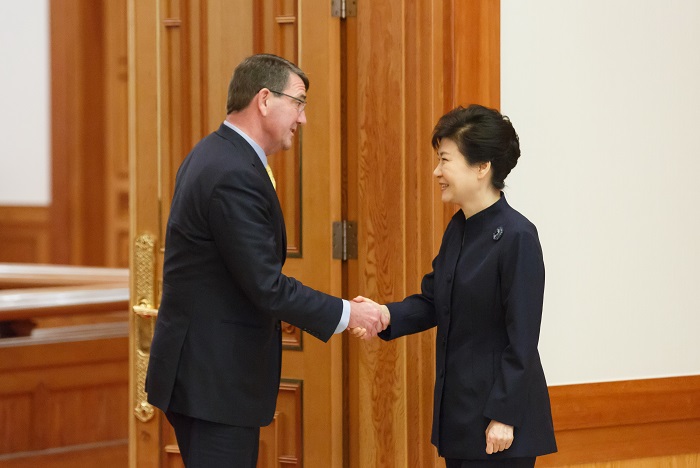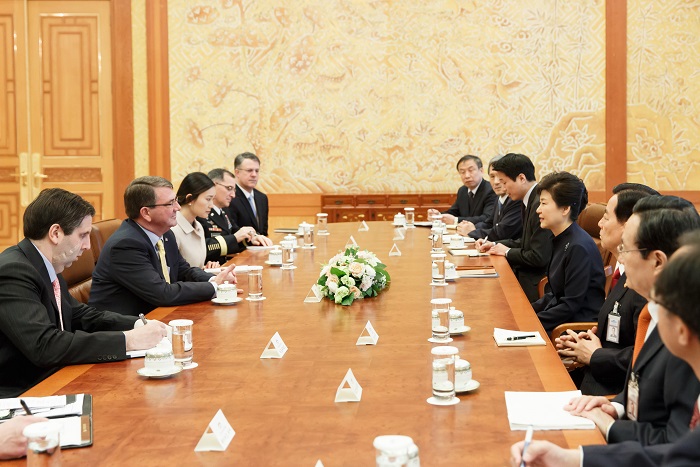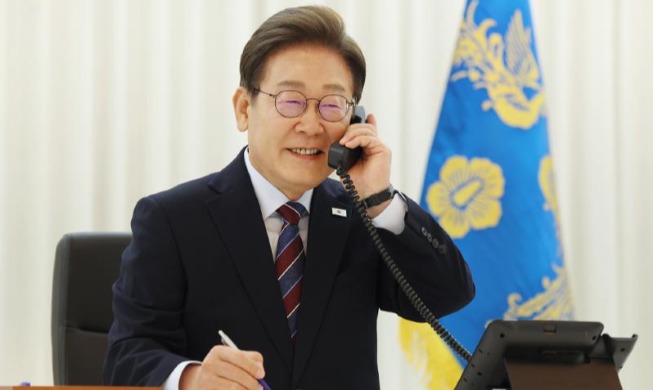President Park Geun-hye met with a U.S. delegation led by Secretary of Defense Ashton Carter on April 10. They discussed the strong U.S.-Korea relationship, the transition of wartime operational control, North Korea's nuclear weapons and bilateral cooperation on cyber security and satellite and space security.
President Park said that she was glad to see Carter appointed as U.S. secretary of defense, as he is well-versed on issues concerning the Korean Peninsula, including North Korea's threat of launching missiles and of its nuclear weapons program.
Carter said that the U.S.-Korea relationship has never been stronger. He hoped that the two nations keep these ties across a broad range of sectors, including politics and the economy, to take the lead in bringing peace and security worldwide.

President Park emphasized that North Korea's development of nuclear weapons, its launch of long-range missiles and cyber attacks all pose a big threat to Korea and to the world. She stressed that it would be the best strategy to maintain a strong U.S.-Korea relationship and to implement a transition plan of wartime operational control, based on terms already agreed upon. Regarding this issue, Carter said that the strong U.S.-Korea alliance plays a key role in maintaining peace on the Korean Peninsula, unlike in Yemen or Afghanistan.
Mentioning Carter's visit to the Cheonan memorial, President Park pointed out that Korea and the international community requested an investigation into the ship's sinking, but that North Korea never gave any response to the results. She continued to say that North Korea doesn't take part in inter-Korea dialogue and keeps pursuing the development of nuclear weapons. She stressed that it is not acceptable for the North to repeat its cycle of behavior: attack, pose a threat, compromise, receive compensation and attack again. She noted that the unification of Korea would be the final solution to the threat of a North Korean missile launch and to its development of nuclear weapons. It would also, she stressed, contribute to bringing peace and security to both the Korean Peninsula and to Northeast Asia more generally.

Carter agreed that it's critical for the U.S.-Korea alliance to maintain its principle to never capitulate to the North's provocations. He hailed Korea's determination to achieve a peaceful unification of the Korean Peninsula. He also emphasized that the key to the Obama administration's "rebalance" policy is not about getting more tanks or high-tech weaponry into Asia, but is about deepening trust with allies, including Korea. He noted that the U.S.' future lies in the Asia Pacific region.
President Park also mentioned recent cyber attacks against Sony and against the Korea Hydro and Nuclear Power Co. She stressed the need for bilateral cooperation on cyber security. Also, in accordance with recent trends toward making efforts to use space for solely peaceful purposes, she asked for Carter's attention on bilateral cooperation concerning defense satellites and space operations.
By Lee Seung-ah
Photos: Cheong Wa Dae
Korea.net Staff Writer
slee27@korea.kr
President Park said that she was glad to see Carter appointed as U.S. secretary of defense, as he is well-versed on issues concerning the Korean Peninsula, including North Korea's threat of launching missiles and of its nuclear weapons program.
Carter said that the U.S.-Korea relationship has never been stronger. He hoped that the two nations keep these ties across a broad range of sectors, including politics and the economy, to take the lead in bringing peace and security worldwide.

President Park Geun-hye (right) meets with US Secretary of Defense Ashton Carter on April 10 in Seoul to discuss the US-Korea relationship, North Korean nuclear weapons and bilateral cooperation on cyber security and satellite and space security.
President Park emphasized that North Korea's development of nuclear weapons, its launch of long-range missiles and cyber attacks all pose a big threat to Korea and to the world. She stressed that it would be the best strategy to maintain a strong U.S.-Korea relationship and to implement a transition plan of wartime operational control, based on terms already agreed upon. Regarding this issue, Carter said that the strong U.S.-Korea alliance plays a key role in maintaining peace on the Korean Peninsula, unlike in Yemen or Afghanistan.
Mentioning Carter's visit to the Cheonan memorial, President Park pointed out that Korea and the international community requested an investigation into the ship's sinking, but that North Korea never gave any response to the results. She continued to say that North Korea doesn't take part in inter-Korea dialogue and keeps pursuing the development of nuclear weapons. She stressed that it is not acceptable for the North to repeat its cycle of behavior: attack, pose a threat, compromise, receive compensation and attack again. She noted that the unification of Korea would be the final solution to the threat of a North Korean missile launch and to its development of nuclear weapons. It would also, she stressed, contribute to bringing peace and security to both the Korean Peninsula and to Northeast Asia more generally.

President Park Geun-hye and US Secretary of Defense Ashton Carter agree that the US-Korea alliance has never been stronger than it is today.
Carter agreed that it's critical for the U.S.-Korea alliance to maintain its principle to never capitulate to the North's provocations. He hailed Korea's determination to achieve a peaceful unification of the Korean Peninsula. He also emphasized that the key to the Obama administration's "rebalance" policy is not about getting more tanks or high-tech weaponry into Asia, but is about deepening trust with allies, including Korea. He noted that the U.S.' future lies in the Asia Pacific region.
President Park also mentioned recent cyber attacks against Sony and against the Korea Hydro and Nuclear Power Co. She stressed the need for bilateral cooperation on cyber security. Also, in accordance with recent trends toward making efforts to use space for solely peaceful purposes, she asked for Carter's attention on bilateral cooperation concerning defense satellites and space operations.
By Lee Seung-ah
Photos: Cheong Wa Dae
Korea.net Staff Writer
slee27@korea.kr
